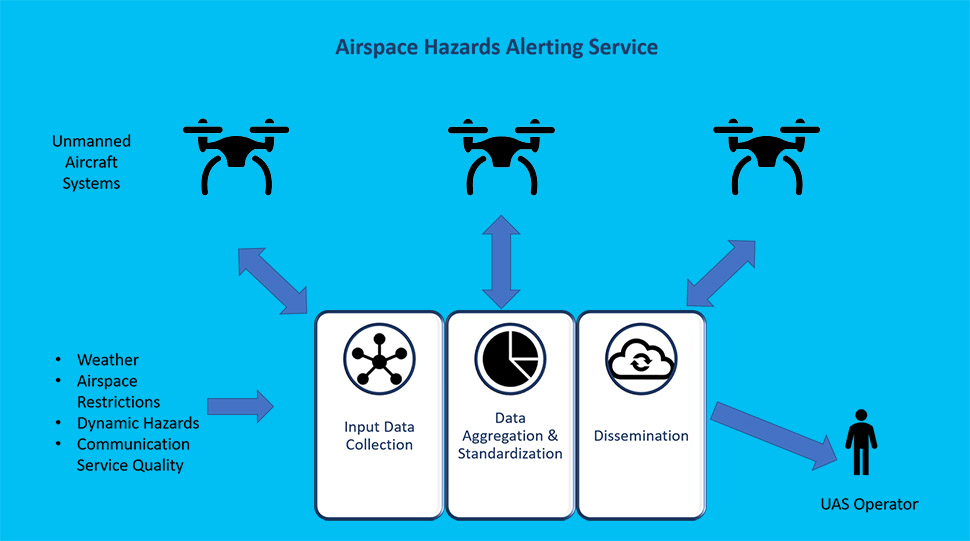In the future, pilotless aircraft will buzz through the air above us, carrying everything from people to cargo. And as cities embrace carbon-neutral transportation, bike lanes will become more common nationwide. Those two innovations come with risks: unmanned aircraft can be battered by storms and other hazards; and bikes are in danger of being struck by cars. Now two Dallas-area startups are working with the University of North Texas (UNT) to make both innovations safer—and the North Texas Center for Mobility Technologies (NTCMT) is aiding the efforts by contributing part of an estimated $600,000 in total funding.
The two projects are the first to be funded by the NTCMT, which launched last December with a goal of making North Texas a leading transportation tech hub through industry-university collaborations. The NTCMT was created in a partnership between the Texas Research Alliance and the North Central Texas Council of Governments (NCTCOG), along with several Dallas-Fort Worth area universities. The NTCOG approved a $2.5 million seed fund to get things moving—in every sense of the word.
Victor Fishman, executive director of the Texas Research Alliance, told Dallas Innovates the final budgets for the two projects “will be determined by discussions between the company sponsors, Emobilus and Hermes, and the University of North Texas.”
NCTCOG is reviewing funding options for the project, Fishman said.
 Hermes and UNT: Detecting airspace hazards
Hermes and UNT: Detecting airspace hazards
How will unmanned aircraft be integrated into America’s airspace? That’s a big question being explored by NASA’s Advanced Air Mobility National Campaign (AAM-NC). NASA wants to help the aviation industry develop a safe unmanned air transport system to move both people and cargo from place to place—in urban, suburban, and rural environments.
One big challenge: hazards in the airspace, including heavy rains and winds and tall buildings and structures. Another obstacle is restricted airspace over installations like military bases and power stations, or certain sports events and public celebrations.
A new startup, Hermes Autonomous Air Mobility Solutions, is partnering with UNT to develop an airspace hazard identification and alerting service (AHAS) for advanced air mobility. Hermes launched just this year with three employees, and will be located in the Dallas-Fort Worth area.
Professor Kamesh Namuduri is UNT’s lead on the project. “The system is based on Professor Namuduri’s patent with UNT,” Fishman told us.
Hermes is an infrastructure partner in NASA’s campaign. “Hermès will demonstrate the project during the AAM-NC flight tests that are expected to occur during Spring 2022,” Fishman said.
“By identifying and alerting the vehicles as well as operators, AHAS will mitigate potential risks and thereby enhance the safety of unmanned air transportation,” Hermes and UNT said in a statement. “With the support from UNT, Hermes plans to develop this cloud-based product and deploy it as a commercial service for AAM by the end of 2022.”
“We’re privileged to work with North Texas Center for Mobility Technologies and contribute to the economic development of the DFW region,” Hermes President Rajendra Penna added in the statement.
Emobilus and UNT: Bike crash prevention
Each year, around 1,000 Americans die and 50,000 are seriously injured when cars collide with cyclists. UNT and Emobilus, a Plano-based startup, are working to change that—with object detection technology that will significantly improve vehicle collision avoidance systems’ awareness of cyclists.
The system is designed to do more than detect bike riders. It will also help existing and developing driver assist systems activate activate a vehicle’s brakes, avoiding collisions before the driver even has time to notice and react.
Emobilus is working with three UNT faculty members on the project: Xinrong Li, Qing Yang, and Song Fu. Founded in 2018, Emobilus has three employees and is currently located in Richardson.
Field tests at Inspire Park in Frisco
Last December, UNT and Emobilus connected field operational tests of prototype devices at the university’s Inspire Park facility in Frisco. UNT and Emobilus call the results “positive,” and said in a statement that they’re now pursuing additional R&D toward the design and manufacture of a commercialized product.
A lot of technology is going into this cooperative research agreement: maximizing reflective geometries; signal amplification; Doppler and micro-Doppler signature analysis; a review of existing object detection algorithms; and future object classification and tracking algorithms.
All that, just to keep your butt on your bike seat and your wheels on the road.
UNT and Emobilus say that if the project is successful, the tech can make more than cyclists safer: it can also lead to potential applications for pedestrians, joggers, motorcycles, and e-scooters.
NTCMT: Lidar to EVTOL to micro mobility
The two projects above are just the first to get funding from the NTCMT. The program is bringing coordinated expertise of four local research universities—UNT, SMU, UT Dallas and UT Arlington—to develop mobility tech across the region and around the globe.
NTCMT says it’s pursuing innovation in a long list of areas, including “autonomous vehicles, 5G, EVTOL, electric motors, micro mobility, drones, Lidar, radar, machine vision, freight, drones, first mile, last mile, networking, network splicing, object avoidance, multi-modal, on-demand mobility, last mile, personal mobility, micro mobility, fuel cells, battery, electric motors, motor controllers, route planning and more.”
Total funding ceiling: $2 million per year
NTCMT says it expects to fund multiple projects with a total ceiling of $2 million per year—with the ceiling possibly increased by additional sponsorships. You can learn more and even submit a proposal by visiting NTCMT’s microsite.
EDITOR’S NOTE: This story was updated at 11:04 a.m. CST July 9, 2021.
![]()
Get on the list.
Dallas Innovates, every day.
Sign up to keep your eye on what’s new and next in Dallas-Fort Worth, every day.





![Dr. Justin Lonon, vice chancellor of Dallas College, addresses the crowd at the recent Goldman Sachs 10,000 Small Businesses Dallas Graduation. [Photo: 10KSB]](https://s24806.pcdn.co/wp-content/uploads/2021/06/GoldmanSachs-10KSB-4992-970-970x464.jpg)
























